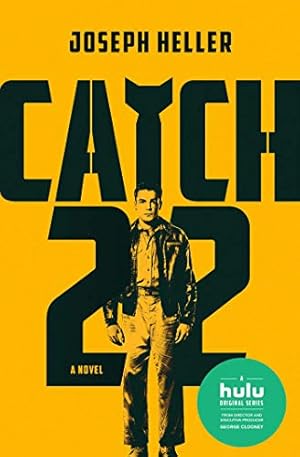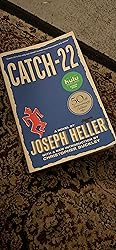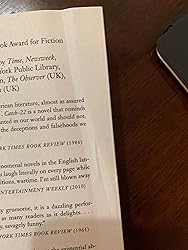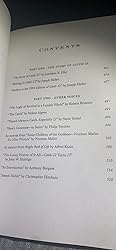| Print List Price: | $19.99 |
| Kindle Price: | $12.99 Save $7.00 (35%) |
| Sold by: | Simon and Schuster Digital Sales LLC Price set by seller. |
Your Memberships & Subscriptions

Download the free Kindle app and start reading Kindle books instantly on your smartphone, tablet, or computer - no Kindle device required.
Read instantly on your browser with Kindle for Web.
Using your mobile phone camera - scan the code below and download the Kindle app.

OK
Image Unavailable
Color:
-

-
-
- To view this video download Flash Player
-

-
 VIDEO
VIDEO -

 Audible sample Sample
Audible sample Sample 


Catch-22: 50th Anniversary Edition Kindle Edition
Nominated as one of America’s best-loved novels by PBS’s The Great American Read.
Now a Hulu limited series starring Christopher Abbott, George Clooney, Kyle Chandler, and Hugh Laurie.
Fifty years after its original publication, Catch-22 remains a cornerstone of American literature and one of the funniest—and most celebrated—books of all time. In recent years it has been named to “best novels” lists by Time, Newsweek, the Modern Library, and the London Observer.
Set in Italy during World War II, this is the story of the incomparable, malingering bombardier, Yossarian, a hero who is furious because thousands of people he has never met are trying to kill him. But his real problem is not the enemy—it is his own army, which keeps increasing the number of missions the men must fly to complete their service. Yet if Yossarian makes any attempt to excuse himself from the perilous missions he’s assigned, he’ll be in violation of Catch-22, a hilariously sinister bureaucratic rule: a man is considered insane if he willingly continues to fly dangerous combat missions, but if he makes a formal request to be removed from duty, he is proven sane and therefore ineligible to be relieved.
This fiftieth-anniversary edition commemorates Joseph Heller’s masterpiece with a new introduction by Christopher Buckley; a wealth of critical essays and reviews by Norman Mailer, Alfred Kazin, Anthony Burgess, and others; rare papers and photos from Joseph Heller’s personal archive; and much more. Here, at last, is the definitive edition of a classic of world literature.
- LanguageEnglish
- PublisherSimon & Schuster
- Publication dateOctober 26, 2010
- File size6115 KB
 “Catch-22. Anyone who wants to get out of combat duty isn’t really crazy.”Highlighted by 4,251 Kindle readers
“Catch-22. Anyone who wants to get out of combat duty isn’t really crazy.”Highlighted by 4,251 Kindle readers He had decided to live forever or die in the attempt, and his only mission each time he went up was to come down alive.Highlighted by 3,715 Kindle readers
He had decided to live forever or die in the attempt, and his only mission each time he went up was to come down alive.Highlighted by 3,715 Kindle readers The Texan turned out to be good-natured, generous and likable. In three days no one could stand him.Highlighted by 3,222 Kindle readers
The Texan turned out to be good-natured, generous and likable. In three days no one could stand him.Highlighted by 3,222 Kindle readers
Editorial Reviews
Amazon.com Review
Yossarian says, "You're talking about winning the war, and I am talking about winning the war and keeping alive."
"Exactly," Clevinger snapped smugly. "And which do you think is more important?"
"To whom?" Yossarian shot back. "It doesn't make a damn bit of difference who wins the war to someone who's dead."
"I can't think of another attitude that could be depended upon to give greater comfort to the enemy."
"The enemy," retorted Yossarian with weighted precision, "is anybody who's going to get you killed, no matter which side he's on."
Mirabile dictu, the book holds up post-Reagan, post-Gulf War. It's a good thing, too. As long as there's a military, that engine of lethal authority, Catch-22 will shine as a handbook for smart-alecky pacifists. It's an utterly serious and sad, but damn funny book.
Review
“One of the most bitterly funny works in the language . . . Explosive, bitter, subversive, brilliant.” —The New Republic
“To my mind, there have been two great American novels in the past fifty years. Catch-22 is one.” —Stephen King, Entertainment Weekly
“This novel is not merely the best American novel to come out of World War II, it is the best American novel that has come out of anywhere in years.” —Nelson Algren, The Nation
“It’s the rock and roll of novels . . . There’s no book like it. . . . Surprisingly powerful.” —Norman Mailer, Esquire
“One of the greatest anti-war books ever written.” —Vanity Fair
About the Author
Christopher Buckley is a novelist, essayist, humorist, critic, magazine editor, and memoirist. His books include Thank You for Smoking, The Judge Hunter, Make Russia Great Again, and The Relic Master. He worked as a merchant seaman and White House speechwriter. He was awarded the Thurber Prize for American Humor and the Washington Irving Medal for Literary Excellence.
Excerpt. © Reprinted by permission. All rights reserved.
From AudioFile
Product details
- ASIN : B0048WQDIE
- Publisher : Simon & Schuster; 50th Anniversary ed. edition (October 26, 2010)
- Publication date : October 26, 2010
- Language : English
- File size : 6115 KB
- Text-to-Speech : Enabled
- Screen Reader : Supported
- Enhanced typesetting : Enabled
- X-Ray : Enabled
- Word Wise : Enabled
- Sticky notes : On Kindle Scribe
- Print length : 540 pages
- Best Sellers Rank: #26,094 in Kindle Store (See Top 100 in Kindle Store)
- #60 in Classic Literary Fiction
- #62 in Classic American Fiction
- #73 in Education & Reference (Kindle Store)
- Customer Reviews:
Videos
Videos for this product

0:41
Click to play video

Catch-22: 50th Anniversary Edition
Amazon Videos
About the author

Joseph Heller was born in 1923 in Brooklyn, New York. He served as a bombardier in the Second World War and then attended New York University and Columbia University and then Oxford, the last on a Fullbright scholarship. He then taught for two years at Pennsylvania State University, before returning to New York, where he began a successful career in the advertising departments of Time, Look and McCall's magazines. It was during this time that he had the idea for Catch-22. Working on the novel in spare moments and evenings at home, it took him eight years to complete and was first published in 1961. His second novel, Something Happened was published in 1974, Good As Gold in 1979 and Closing Time in 1994. He is also the author of the play We Bombed in New Haven.
Customer reviews
Customer Reviews, including Product Star Ratings help customers to learn more about the product and decide whether it is the right product for them.
To calculate the overall star rating and percentage breakdown by star, we don’t use a simple average. Instead, our system considers things like how recent a review is and if the reviewer bought the item on Amazon. It also analyzed reviews to verify trustworthiness.
Learn more how customers reviews work on AmazonReviews with images
-
Top reviews
Top reviews from the United States
There was a problem filtering reviews right now. Please try again later.
The main character is Captain Yossarian, a bombardier who is convinced he is going to die on a mission. In chapter two, he explains to fellow officer, Clevinger why: "They're trying to kill me," Yossarian told him calmly. "No one's trying to kill you," Clevinger cried. "Then why are they shooting at me?" Yossarian asked. "They're shooting at everyone," Clevinger answered. "They're trying to kill everyone." "And what difference does that make?" Yossarian's fear of dying on a bombing raid was enhanced by his group commander, Colonel Cathcart. His lack of compassion was buoyed by his desire to be a general and more importantly, to be featured in 'The Saturday Evening Post'! If the Air Force wanted 40 missions before you could go home, the Colonel wanted 45. Every time someone came close to obtaining the target number of missions for being sent home, Colonel Cathcart raised the required number again. The Colonel is only one of the complex characters in this novel.
I have many favorite characters and situations in this sometimes disturbing, but whimsical story. The first is Lt. Milo Minderbinder, the mess hall officer. From day one, he wheels and deals like no other war time entrepreneur. He gets away with his shenanigans by telling everyone that they have a share in his enterprises. In chapter 22, he explains his egg business: ..." I make a profit of three and a quarter cents an egg by selling them for four and a quarter cents an egg to the people in Malta I buy them from for seven cents an egg. Of course, I don't make the profit. The syndicate makes the profit. And everybody has a share." He gets into so many businesses that he even deals with the Germans! In chapter 24, he takes a contract from the Germans to bomb his own base: "This time Milo had gone too far. Bombing his own men and planes was more than even the most phlegmatic observer could stomach, and it looked like the end for him...Milo was all washed up until he opened his books to the public and disclosed the tremendous profit he had made." Then he says in the same chapter: "I'd like to see the government get out of war altogether and leave the whole field to private industry. "As the Milo character gets deeper into the book, it only gets more humorous.
My second favorite is Major Major Major Major, the squadron commander, who looked like Henry Fonda! People who met him were always impressed by how unimpressive he was! In chapter nine, we learn: "With a little ingenuity and vision, he had made it all but impossible for anyone in the squadron to talk to him, which was just fine with everyone, he noticed, since no one wanted to talk to him anyway." In chapter ten, we find that: "Major Major never sees anyone in his office while he's in his office." But you can see him, if he is not in his office. If you try to barge into his tent, he goes out the window. I know it's confusing, but his first, middle and last name was Major, thus the four 'majors' when he got promoted to, you guessed it, Major.This book is a riot.
My third favorite is Major-------de Coverley, Major Major Major Major's executive officer. Throughout the novel he has a blank for his first name. His function is uncertain at best. He basically pitches horseshoes all day, kidnaps Italian workers, and rents apartments for his men to use on rest leave. As soon as he hears of a city that the U.S.Army has captured, he's on his way there, usually at the head of the procession in a Jeep. No one ( friend, or foe ) knows who he is! But the reader knows that he is there just to rent apartments for his men. His picture appears in many publications, as if he is is leading the conquering army. I'm telling you this book is a gas.
There are two subplots that are absolutely hysterical. The first involves the Chaplain's hostile assistant, Cpl. Whitcomb. The corporal comes up with the following generic condolence letter: "Dear Mrs., Mr., Miss, or Mr. And Mrs. Daneeka: Words cannot express the deep personal grief I experienced when your husband, son, father, or brother was killed, wounded, or reported missing in action."This one was sent to Doc Daneeka's wife, even though the Doc wasn't dead. Col. Cathcart feels this letter will prove his concern for his men and finally get him in The Saturday Evening Post. He promotes Whitcomb to sergeant! The second subplot revolves around our hero, Yossarian. After Yossarian tells Lt. Nately's whore that Nately was killed in action, She tries to kill Yossarian and she relentlessly pursues him chapter, after chapter. Nobody knows why she wants to slay him, but it is funny.
The reader will also meet: Chaplain Tappman, who is intimidated by everyone; Nurses Cramer and Duckett; Hungry Joe and his screaming nightmares; Chief White Halfoat, who knows he is going to die of pneumonia; Aarfy, the navigator; and Huple, the fifteen year old pilot, just to mention a few. How Joseph Heller kept track of all these characters is unbelievable.There is so much going on in this book that I had to take notes to remember who is who, and who did what.This is a great American classic and should be read by book lovers of all genres. The great American author Studs Terkel states in the `other voices' section of this book: "You will meet in this astonishing novel, certainly one of the most original in years, madmen of every rank: Major Major Major, on whose unwilling frame the gold leaf is pinned because of his unfortunate resemblance to Henry Fonda; Doc Daneeka, who is declared dead despite his high temperature; Hungry Joe and his fistfights with Huple's cat; ex-pfc Wintergreen, who has more power than almost anybody." Enough said?
The syndrome of ‘Catch-22’ existed before Heller’s novel, though maybe not to such an exaggerated extent. Heller gave it a name and a narrative to illustrate how it manifested and spread like a virus. The bombardier Yossarian tries to be sick to get out of flying more missions. Having “almost jaundice” is not sick enough. He tries to be crazy to get the doctor to restrict him from flying missions. He can’t get crazy enough. In fact, his expression of insanity brings him to collide with a definitive articulation of ‘Catch-22’:
“Orr would be crazy to fly more missions and sane if he didn’t, but if he was sane he had to fly them. If he flew them he was crazy and didn’t have to: but if he didn’t want to he was sane and had to.”
Yossarian sees the perfection in such a clause:
“Yossarian saw it clearly in all its spinning reasonableness. There was an elliptical precision about its perfect pairs of parts that was graceful and shocking, like good modern art, and at times Yossarian wasn’t quite sure that he saw it all, just the way he was never quite sure about good modern art.”
There are dozens of examples of how various characters embody ‘Catch-22’. Yossarian’s commanding officer Colonel Cathcart is driven by a vain desire to be the subject of a feature in the Saturday Evening Post, just like one of his rivals. He feels that if his regiment flies more missions than any other that’s a significant accomplishment worthy of a feature article. Therefore, once any of his soldiers are within sight of reaching the previous goal of 40 missions, say, he will raise the number of missions to 45. He keeps raising the number throughout the rest of the novel so that the end total is somewhere in the 80’s. Yossarian may not know the reason Cathcart keeps raising the number as we the readers do but he feels the immediate effect of such capriciousness.
The major named Major Major Major Major (his father’s bizarre sense of humor inspired him to give his son a first and middle name to match his surname) is mystified by his promotion as he has done absolutely nothing to merit it. He didn’t ask for more responsibility and he refuses to accept it. Therefore, he devises a modus operandi that is permeated with ‘Catch-22’:
“From now on,” he said, “I don’t want anyone to come in to see me while I’m here. Is that clear?”
“Yes, sir,” said Sergeant Towser. “Does that include me?”
“Yes.”
“I see. Will that be all?”
“Yes.”
“What shall I say to the people who do come to see you while you’re here”
“Tell them I’m in and ask them to wait.”
“Yes sir. For how long?”
“Until I’ve left.”
“And then what shall I do with them?”
“I don’t care.”
“May I send them in to see you after you’ve left?”
“Yes.”
“But you won’t be here then, will you?”
“No.”
One person who has used the climate of Catch-22 and seized the opportunity to use it to his advantage is Yossarian’s friend Milo Minderbinder. Milo is ostensibly the mess hall manager. However, he has used his mess hall title as a jumping off point to build a commercial empire. He has become the super profiteer, taking free enterprise to the soldiers, buying at a discount, selling at a profit, buying as part of a complex trade rendering an even greater profit, all in the name of the “syndicate”. Everyone wins because everyone owns a share. The fact that the syndicate’s shareholders include enemies as well as allies does not stop Milo from doing business with them in the least.
Yossarian and his friends usually go to Rome when they get any leave and visit the same brothel. Yossarian has become especially friendly with one whore, Luciana, and Nately has fallen in love with another and wants to marry her. Their pimp is a 107-year old Italian who sits in the middle of the floor and pontificates. When he says that America will lose the war, Nately takes issue and says America is the strongest nation on earth. The old man concedes that Italy is a weak country but contends that it will prevail:
“The Germans are being driven out, and we are still here. In a few years you will be gone, too, and we will still be here. You see, Italy is really a very poor and weak country, and that’s what makes us so strong. Italian soldiers are not dying any more. But American and German soldiers are. I call that doing extremely well. Yes, I am quite certain that Italy will survive this war and still be in existence long after your own country has been destroyed…All great countries are destroyed. Why not yours? How much longer do you really think your own country will last?”
Nately says he talks like a madman:
“But I live like a sane one. I was a fascist when Mussolini was on top, and I am an anti-fascist now that he has been deposed. I was fanatically pro-German when the Germans were here to protect us against the Americans, and now that the Americans are here to protect us against the Germans I am fanatically pro-American. I can assure you, my outraged young friend”—the old man’s knowing, disdainful eyes shone even more effervescently as Nately’s stuttering dismay increased—“that you and your country will have no more loyal partisan in Italy than me—but only as long as you remain in Italy.”
Yossarian’s roommate, the aforementioned Orr, has a scheme that is only apparent near the novel’s end. Orr flies plenty of missions. However, most of them end with his plane going down in the ocean. Yossarian views Orr as a bad-luck charm and refuses to fly any more missions with him. The pattern goes, Orr flies, Orr’s plane goes down, Orr is rescued, Orr flies again. And repeat. Near the end of the novel, Orr has disappeared. His remains were never found. No trace of him was found. Later, it is discovered that he has made his way all the way to neutral Sweden, sanity and safety. His scheme was the cleverest of any of them and he inspires Yossarian, who is finally given terms under which he can go home. However, to do so he is presented with another untenable catch. He will be a decorated war hero and he must say only nice things about his commanders. Orr’s success, however, provides him with another option WITHOUT a Catch-22.
‘Catch-22’ is, without doubt, an important and influential novel. Heller articulates certain realities of war and being the pawn of military gamesmanship that many had felt before. I’m not sure that the scrambled time sequence really contributes to the impact of the brutal satire, although it does provide a narrative equivalent to the circular reasoning that forms the basis for most of the decision-making in the novel. There are also so many characters in the novel and few of them are clearly delineated so that when they speak with Catch-22 reasoning, they’re mouthpieces for Heller more so than characters with unique identities. Despite these shortcomings, ‘Catch-22’ caught the zeitgeist of its time and reflected it back to a receptive audience ready to not conform and not accept choices within which were somewhere buried a Catch-22.
This book is a fantastic satire, not only of the military bureaucracy within which it takes place, but of the entire hierarchical system of post-war Western society. It is both bleak and hilarious. I can’t recommend it highly enough.
Top reviews from other countries
Now this is a novel that my 17-year-old self would not, I honestly suspect, have been at all interested in, but fully 60 years later I can find neither reason nor rationale why it took me so long to discover this wonderful, funny (yet at times almost heartbreaking) story. It is a tale of the dying days – dying is an important word here – of WWll and a cadre of characters that struggle in many different ways to hang-on, survive (and in some cases succeed) in what was assuredly an inconvenient and almost certainly an uncompromising environment.
A lot of other reviewers will undoubtedly try to paint portraits of characters - the likes of Yossarian, Minderbinder, the twin Colonels Cathcart and Korn, and the rest, and I’ll gladly leave that to them, but I believe you deserve the honour, the privilege, of meeting and knowing them on your own. I will say this: Heller spent seven painstaking years to bring this extraordinary novel to fruition, and his efforts paid off brilliantly. If you’re like me, you will wrap this story around you like a warm blanket on a cold night and experience side-splitting laughter in one breath before being plunged into almost inconsolable sadness the next.
And this book deserves to be read cover-to-cover, book ended as it is by Christopher Buckley’s telling Introduction, and “The Story Of Catch-22” plus a collection of nine terrific essay/reviews.
Read it all. Revel in Heller’s masterful storytelling. I’m certain you’ll love this outstanding work of fiction (that maybe isn’t all that fictitious!)
Una edición cómoda de leer pero sencilla.
Pesa lo minimo posible, aunque es una novela bastante gorda por su extensión.
Muy recomendable
Reviewed in Spain on September 18, 2022
Una edición cómoda de leer pero sencilla.
Pesa lo minimo posible, aunque es una novela bastante gorda por su extensión.
Muy recomendable
























